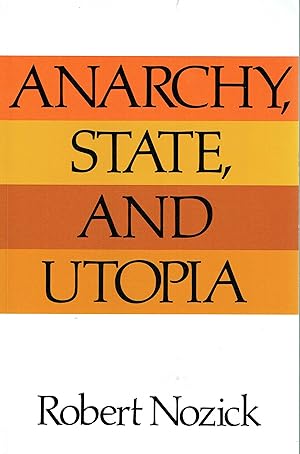

In the first part Nozick seeks to establish the legitimacy of what he calls the "minimal" state. We should note, however, that a map of a territory, its contours and prominent features, can be a great aid in fixing that territory's whereabouts.Īnarchy, State and Utopia is divided into three major parts.

In general, Anarchy, State and Utopia provides a revealing map of a certain territory, but little explicit information about where this territory is. These suggestions are sound, albeit familiar within libertarian theory. Nozick does offer certain suggestions, viz., that there is an "underlying Kantian principle that individuals are ends and not merely "means", that to use a person (in certain ways) "does not sufficiently respect and take into account the fact that he is a separate person, that his is the only life he has", and "that there are different individuals with separate lives and so no one may be sacrificed for others". For by focusing with these realms Nozick bypasses some of the most difficult questions for libertarian theory, e.g., questions about the source, foundations, underlying character, etc. Of these works, Nozick's exploration ranges widest and is the most arduous.įor the most part Nozick explores the overlapping realms marked by the terms "natural rights theory" and "state of nature theory." That Nozick's investigations are primarily within these realms may be a source of disappointment to some readers. Hayek's Law, Legislation, and Liberty, and most recently, Nozick's Anarchy, State and Utopia. These are David Friedman's The Machinery of Freedom (in particular, Part III), the first volume of F.A.

It is one of the most encouraging signs of the times-the most encouraging for those who like myself look at the world through ivory-colored glasses-that we have recently witnessed the publication of three works which expand the known world of libertarian theory. But in either case the voyage opens up new intellectual territory. The mappings which such an exploration yields may be highly accurate or in need of radical revision. Such projects are explorations, intellectual voyages which reveal previously unchartered ideas, arguments, and theses. Robert Nozick describes his Anarchy, State and Utopia as, "a philosophical exploration of issues, many fascinating in their own right, which arise and interconnect when we consider individual rights and the state." Such explorations are to be contrasted with political tracts-but what makes the difference? Is a philosophical exploration merely what gets written when an aspiring author is too uncertain about his views to write a tract or manifesto? No, there is more to be said about philosophical explorations than this. 10).Anarchy, State and Utopia, by Robert Nozick, New York: Basic Books, 1974, 367 pp., $12.95. 7, Section 2) and other arguments attempting to justify more than the night-watchman state (Ch. I shall thus not address his discussions of Rawls' theory of justice (Ch. Below I shall focus only on his core argument. The argument is complex, and Nozick often inserts long-and very interesting-digressions. The other is that nothing more extensive than the night-watchman state is legitimate, except with the consent of all. One is that a night-watchman state (which protects only against violence, theft, fraud, and breach of contract) could be legitimate, even without the consent of all those to be governed.

At the core of Nozick's book are two arguments. This all changed with the publication of Rawls's articulation and defense of liberal egalitarianism and Nozick's libertarian challenge to the legitimacy of anything more than the night-watchman state. Moreover, to the extent that normative theories were considered, utilitarianism was the center of attention. For much of the preceding half-century, under the influence of logical positivism's heavy emphasis on empirical verifiability, much of moral philosophy was taken up with meta-ethics (e.g., the semantics of moral discourse)-with little attention given to normative moral theories. Robert Nozick's Anarchy, State, and Utopia (1974), along with John Rawls's A Theory of Justice (1971), radically changed the landscape in analytic political philosophy.


 0 kommentar(er)
0 kommentar(er)
